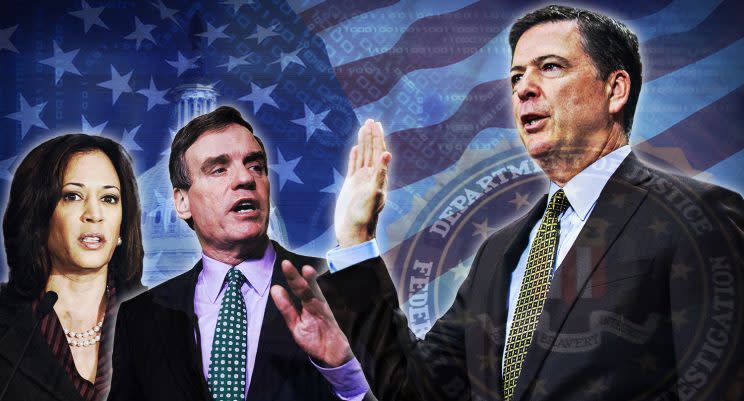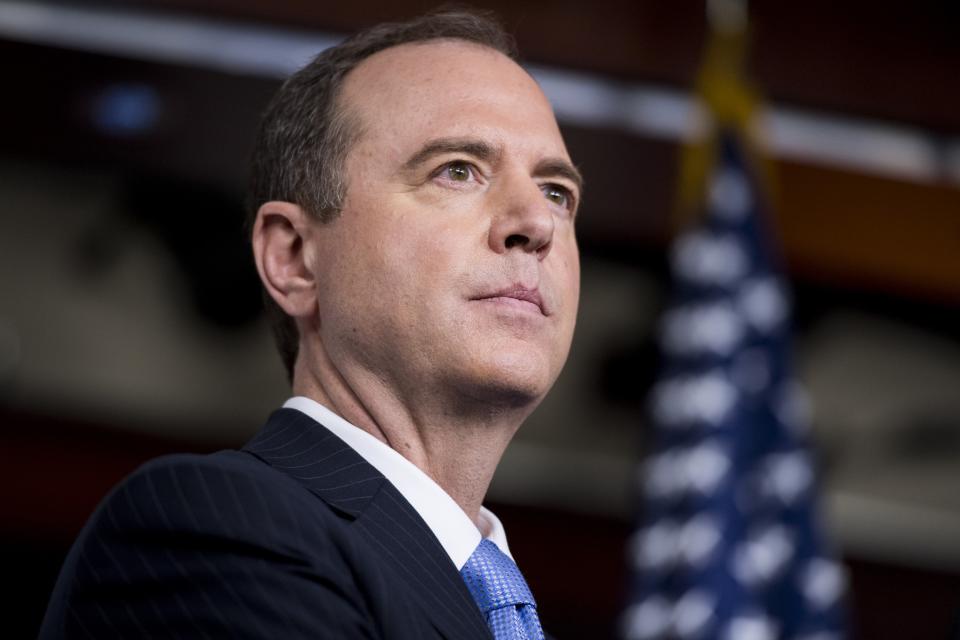Democrats to drill down on Trump obstruction in Comey hearing

WASHINGTON — On Thursday morning, Senate Democrats have what could be their only chance to publicly question former FBI Director James Comey about whether President Donald Trump attempted to interfere in the bureau’s investigation of Russian meddling in the U.S. elections.
Special counsel Robert Mueller has taken over the investigation into members of the Trump campaign’s alleged ties to Russia, a probe that could take years and might never end up implicating the president. Thursday’s hearing, however, is the Democrats’ best chance to convict the president in the court of public opinion — assuming Comey is willing to play along.
The former FBI director released a detailed, seven-page opening statement to the Senate intelligence committee Wednesday afternoon that gave the committee’s Democrats several possible avenues for questioning. He wrote that the president asked Comey to “let … go” his investigation of former national security adviser Mike Flynn, who is alleged to have lied about his earlier contacts with Russian officials. Trump, Comey wrote, also asked the longtime law enforcement official to pledge his “loyalty” to him in a private dinner.
Trump also repeatedly asked Comey to lift the cloud of the Russia investigation from over his head, according to the statement. Comey wrote that he “implored” Attorney General Jeff Sessions “to prevent any future direct communication between the President and me,” because he felt the president’s attempts to isolate him were inappropriate.
But Comey stopped short of concluding that Trump was attempting to obstruct his investigation — a potential crime Democrats are eager to pin on the president. It’s also unlikely the former FBI director will offer his personal opinion on whether the president’s actions amounted to obstruction, even under questioning. The other big questions — whether Comey was fired for not pledging loyalty to Trump or not making “the cloud” of the Russia investigation go away — also can’t be answered directly by Comey.
But Senate Democrats can drill down on the context of Comey’s conversations with the president, pumping him for more details in order to better make a case on their own for obstruction. The Jan. 27 one-on-one dinner Comey describes in his statement, for example, occurred the day after then acting Attorney General Sally Yates said she warned the White House that Flynn had lied to the vice president about not having contact with Russian officials.
“The dates are very significant,” Rep. Adam Schiff, D-Calif., the ranking member of the House Permanent Select Committee on Intelligence, told Yahoo News. “The first dinner takes place the day after Sally Yates goes to the White House to warn the White House counsel about Flynn. The very next day, the president wants loyalty. Was there more to that conversation that could shed light on what the president’s motivations were? Did Flynn come up in that conversation? A lot of those factual details in that conversation are going to be important.”

Democrats on the committee, who include Vice Chair Mark Warner of Virginia and newcomer Sen. Kamala Harris of California, will also almost certainly ask for details about who exactly Comey told about each of his conversations, and the whereabouts of any memos detailing them — all of which could become potential evidence for the Senate investigation going forward.
At least some of the Intelligence Committee’s Republican members are likely to focus on Comey’s admission that on three separate occasions he reassured Trump he was not a suspect in the FBI investigation — a claim the president made in his letter firing Comey that was met with skepticism by Democrats. The Republican National Committee quickly blasted out those excerpts from Comey’s statement Wednesday night, and some Republican senators will likely use their questions to make the hearing about how Trump was not being personally investigated at the time of Comey’s conversations with him. (The Senate Intelligence Committee’s chairman, Richard Burr, R-N.C., told the Guardian Wednesday he thought the president was within his rights to ask Comey for loyalty, suggesting this will also not be a theme of questioning for the committee’s Republicans Thursday.)
Schiff says Democrats should also ask Comey why he told the president he was not a subject of investigation, since usually the FBI director would not be asked or answer that sort of question. “Well, I would frankly drill down on some of his explanations for why he didn’t inform people at Justice about his concerns [about Trump], as well as why he took it upon himself to tell the president he was not a suspect of the investigation,” Schiff said.
A Senate Democratic aide said he expected committee members to also seek answers regarding Attorney General Sessions’ role in the Russia investigation given that Sessions recused himself due to his role in the Trump campaign. Comey writes in his opening statement that Sessions didn’t answer him when he asked him not to leave him alone with the president; lawmakers will likely ask him if Comey and Sessions had any other interactions along those lines.
Democrats expect Comey’s testimony will stick fairly closely to his written statement, and will rebuff questions from lawmakers about the state of the investigation into Russian interference in the U.S. presidential election at the time of his firing. Still, Democrats will likely try to ask him who was a subject of that investigation.
“Well, I do expect that he won’t discuss the Russian investigation itself,” Sen. Angus King, an independent from Maine who caucuses with Democrats and is on the intel committee, told CNN Wednesday. “In other words, the investigation that [Special Counsel Robert] Mueller is now in charge of, I don’t expect him to give us an update or anything from what it was like or what he knew when he left. I’ll be surprised if he does that.”
Even if Comey refrains from discussing details of the investigation or opining on the president’s actions, Democrats are counting on the detail-oriented former director to lay down a trail of facts that they can follow as the Senate investigation continues.
Read more from Yahoo News:


